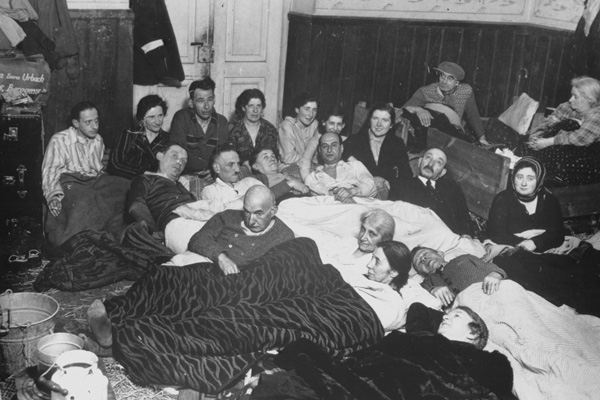
Jewish men and women from Vienna live in crowded barracks in the Opole Lubelskie ghetto in German-occupied Poland, 1941. US Holocaust Memorial Museum, courtesy of Lilli Schischa Tauber
2022 J. B. and Maurice C. Shapiro Annual Lecture
In 1939, the year after the Nazis annexed Austria, Wilhelm and Johanna Schischa sent their daughter to England on a rescue transport for children. Any hope of reuniting with her ended with their deportation to “the East,” along with tens of thousands of other German-speaking Jews. They suddenly found themselves in a foreign place with few possessions, little food, and no money.
Masses of deportees died or were murdered far from home in places like Minsk and Riga and in killing centers in German-occupied Poland. But others survived ghettos, forced labor, and death marches. Join us to learn what diaries and letters reveal about their experiences.
Opening remarks
Dr. Lisa Leff, Director, Jack, Joseph and Morton Mandel Center for Advanced Holocaust Studies
Speaker
Dr. Andrea Löw, 2021–22 J. B. and Maurice C. Shapiro Senior Scholar-in-Residence; Deputy Director, Center for Holocaust Studies, Leibniz Institute for Contemporary History, Munich
Moderator
Dr. Elizabeth Anthony, Director, Visiting Scholar Programs, United States Holocaust Memorial Museum
The in-person program will be followed by a reception.
This program is free and open to the public, but registration is required.
For more information, please contact calendar@ushmm.org.
The J. B. and Maurice C. Shapiro Senior Scholar-in-Residence Fellowship, endowed by the J. B. and Maurice C. Shapiro Charitable Trust, enables the Mandel Center to bring a distinguished scholar to the Museum each year to conduct innovative research about the Holocaust and disseminate this work to the public. The scholar in residence also leads seminars, lectures at universities in the United States and serves as a resource for the Museum, educators, students, and the general public.
The Jack, Joseph, and Morton Mandel Center’s mission is to ensure the long-term growth and vitality of Holocaust Studies. To do that, it is essential to provide opportunities for new generations of scholars. The vitality and the integrity of Holocaust Studies require openness, independence, and free inquiry so that new ideas are generated and tested through peer review and public debate. The opinions of scholars expressed before, during the course of, or after their activities with the Mandel Center do not represent and are not endorsed by the Museum or its Mandel Center.
